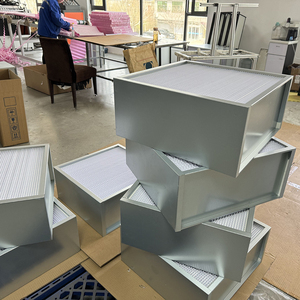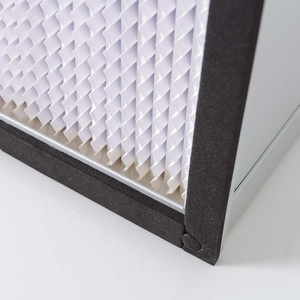
All categories
Featured selections
Trade Assurance
Buyer Central
Help Center
Get the app
Become a supplier

(7487 products available)





















































Cooker hoods have a way of ensuring that the kitchen area is void of smoke, odors, steam, or greasy air. Out of the many types of cooker hoods, aluminum-tin filters stand out in the market for their efficiency and performance. This is because they are designed with high-quality aluminum and coated with tin. As a result, they are more durable and can withstand the high temperatures and pressures that come with filtering kitchen air. Additionally, the tin coating resists corrosion and makes the filter easy to clean whenever it's necessary. For that reason, aluminum filters for cooker hoods can be an excellent choice when looking for filters that are both durable and easy to maintain.
Besides this, aluminum filters for cooker hoods can generally be categorized into various types, depending on design and structure. They include;
Cooking Fumes Management:
Aluminium cooker hood filters trap grease from frying and other cooking fumes. This keeps hoods and kitchen surfaces clean. They also filter out particles from the air, helping to prevent a build-up of unfiltered cooking fumes.
Kitchens in Commercial Settings:
Filter can prevent fires from excessive grease build-up in busy kitchens. This reduces the risk by trapping grease. They also protect exhaust systems by ensuring efficient ventilation, which is crucial for chef's safety and proper air circulation, especially in establishments that operate at high temperatures.
Modern Kitchens:
These hood filters allow kitchen owners to enjoy open cooking spaces by quietly and efficiently removing smoke, odours and fumes. This is important for homes because it keeps the air fresh and the living areas connected to the kitchen clean. High-performance filters help ducted ventilation systems by conserving energy and increasing airflow while reducing noise.
Grill and Stove Protection:
Filter prevents grill and stove damage by trapping grease and condensate, which can cause rust and corrosion. This lengthens their lifespan. They also keep kitchen equipment such as drawers and cabinets clean by preventing grease from spreading.
Grease Fire Prevention:
Cooker hoods with metal filters help stop grease fires, which can start from oil on hot surfaces or flames. The filters keep kitchens safer by filtering out grease before it reaches an open flame. This is very helpful in kitchens where frying is done because those fires are the most common grease fire cause.
Restaurants Hood:
In restaurants, extractor hoods and filters are needed to remove strong cooking smells from the air. Aluminium filters are good because they let more air through than other kinds. This keeps the dining area and the outside air clean by filtering out smoke, grease, and smells before they escape.
Different types of cooker hood filters are used in restaurants and commercial kitchens. It can be seen in the exhaust systems. These facilities operate continuously in high-temperature cooking, which demands filters capable of withstanding heat and efficiency in air quality maintenance.
The following tips will help buyers to choose the right aluminium filter.
Check the Number of Layers
Each layer of the filter catches more particles. So, a filter with more than one layer is much more efficient. It will trap tiny particles that a single-layered one would let pass.
Look at Filtration Technique
The filter's filtration mechanism is very important. It directly affects the filter's ability to clean the air. So, one should pick a cooker hood filter with multiple filtering methods. It could be centrifugal, mesh, or any other kind. Multiple methods will make sure that one removes dust, grease, and other harmful particles from the air.
Know the Maintenance Requirements
An aluminium cooker hood filter takes the cake when it comes to ease of maintenance. These filters need regular cleaning but they are very easy to clean. Many aluminium filters are also washable. One has to read the manufacturer's guidelines to know the proper cleaning procedure. However, some filters need more than just a scrub. They also need replacement at certain intervals. The frequency of replacing the filter will depend upon the duration of use in the kitchen.
Choose the Right Size
The filter's size is very important. It needs to fit perfectly inside the hood's filter slot. Otherwise, it will not serve its purpose. So, one has to carefully measure the cooker hood's dimensions. Then, check what size aluminium filter it can accommodate.
Check for Certifications
Buyers should look for filters that have been tested and certified. Such filter certifications provide peace of mind knowing that the filter works effectively. The grease and particulate filtration certifications indicate that the filter can do its job. Such certification means that one will not have to worry about the filter's performance.
Cost
Although buyers may want to buy filter materials that are cost-effective, they should note that very low-cost filters may be a false economy. This is because they would need more frequent replacement than higher-quality filters. When choosing filters, it is crucial to consider long-term costs instead of short-term costs.
Q1: What are the advantages of using aluminium filters for cooker hoods?
A1: Aluminium is resistant to corrosion and rust, making it an ideal material for creating filters for cooker hoods. An aluminium filter is lightweight, has a sturdy build, is safe, and can be recycled.
Q2: What are the benefits of using an oil filter?
A2: An oil filter efficiently captures and removes oil from the air, preventing oil from settling on surfaces and in the kitchen. An oil filter prevents unwanted odours and foul smells.
Q3: How often should filters be replaced?
A3: If the filter is made of metal, it can be replaced every 5 to 7 years. However, if it is made of plastic or paper, it will have to be replaced every 1 to 2 years.
Q4: What is the maximum temperature that a cooker hood filter can withstand?
A4: A cooker hood filter can withstand a maximum temperature of 60 to 70 degrees Celsius.